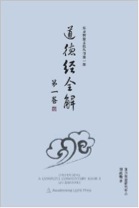Here.
Category Archives: Daodejing
New Book on Daoism
Three Pines Press proudly announces the second volume in our new series
Contemporary Chinese Scholarship in Daoist Studies
Rediscovering the Roots of Chinese Thought: Laozi’s Philosophy
by CHEN Guying, translated by Paul D’Ambrosio
ISBN 978-1-931483-61-2
paperback, 150 pages, bibliography, index
available January 1, 2015
US $27.95
prepublication special: US $22.50
ORDER NOW: www.threepinespress.com<http://www.threepinespress.com/>
New Daoism Journal
I have recently learned that Professor Zhan Shichuang 詹石窗 of Sichuan University is founding an English-language academic journal, Frontiers of Daoist Studies. Anyone interested in submitting work can contact Zhang Lijuan 张丽娟, a postdoctoral fellow in the Institute of Religious Studies, who represents the Editorial Office of the journal.
Preliminary Program Available for Daoism Conference
The preliminary schedule for the 9th International Conference on Daoist Studies, to be held at Boston University from May 29, June 1, 2014, is now available at the Conference website. It’s an impressive line-up!
New Journal of Daoist Studies, and New Zhuangzi book
Three Pines Press proudly announces the publication of Zhuangzi: Text and Context, by Livia Kohn, to appear in January 2014. (330 pages; Paperback:$35.95; prepublication special: $28.50 plus S & H.) For details and to order, please go to http://threepinespress.com/
We are also happy to present the table of contents for the next issue of the Journal of Daoist Studies (vol. 7), to be published in February 2014. For details, please see below.
Ziporyn’s Beyond Oneness and Difference Published
The second volume of Brook Ziporyn’s new work on li and coherence in pre-Neo-Confucian Chinese thought has been published. See below for summary and Table of Contents for both volumes.
Call for Reviews – Dao De Jing: A Complete Commentary by Zhankui Liu
I received this information from the publisher of these books, and pass it on for your information:
Call for Reviews – Dao De Jing: A Complete Commentary by Zhankui Liu

A free copy will be sent to the reviewer by the publisher (Awakening Light Press) for these titles:
Language: Simplified Chinese
Publisher: Awakening Light Press
Do Nothing, Blue!
Manyul and I both received our PhDs from the University of Michigan, so I must call attention to Sam Crane’s blog post concerning UM basketball player Jon Horford’s fascination with the Dao De Jing. Michigan plays for the National Championship on Monday night; as Sam says, Do Nothing Blue — and there is nothing that will be undone!
Transcription of Beida Laozi Manuscript On-Line
As many of you know, there are more and more excavated texts making their presence known in our field. Beijing University is in possession of a bamboo-strip version of the Laozi / Daode Jing that they date to the Western Han; a full transcription is available here; just scroll down past the pictures.
Barnwell on Classical Daoism Part 4.1
Long-time friend of the blog, Scott Barnwell, has posted his fourth installment exploring the question of whether there really is such a thing as “classical Daoism,” over on his blog, Bao Pu. Here are a couple of paragraphs; go over and check it out. Discuss there or here, as you wish — if here, please address all comments to Scott.
The purpose of this 4th essay is to explore these two texts to see what similarities and differences exist. If we understand a “school of thought” (modern Chinese: Xuepai ??) to refer to a system or complex of beliefs, ideas, values and methods, would the various authors of the Laozi and Zhuangzi constitute such a school, as is commonly believed? Or were they two different schools of thought with only slight overlap, perhaps a Laoist school and a Zhuangist school? Is there a “family resemblance” that exists between these two texts that does not between them and others, such as the Mengzi, Mozi, Hanfeizi or Yijing? Jia ?, which commonly meant “house” or “family,” has suggested to Harold Roth that Sima Tan’s use of it “implies that he thought of his six groups as having an important lineage dimension in which masters and disciples functioned according to a family model.”[7] By positing a lineage of masters and disciples (= teachers and students) we come close to the idea of a school (of thought) as well, although whether the contributors to the Laozi and Zhuangzi were two branches of one lineage remains to be seen.
We’ve already explored the nature of ancient Chinese texts and some possible scenarios of how the texts came to be in the earlier essays, especially the 3rd one on Zhuangzi. We have hypothesized that the existence of the Laozi and Zhuangzi required some sort of lineage or group that had compiled and preserved (and added to) these texts, at least until the Han dynasty period where texts were sought out by regional rulers and the imperial government in order to preserve the classical legacy in various libraries. These groups need not have been large, and, further, we do not know if this lineage was unbroken, or whether decades went by where the texts sat neglected in boxes in people’s homes.

